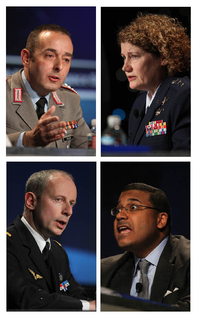Spotlight
Panel Looks at Global SSA
Written by: developer
 The Space Situational Awareness (SSA) panel presented at the 27th National Space Symposium in association with the AMOS Conference, a Project of the Maui Economic Development Board, Inc., took a decidedly global look at the issues related to the growing amount of space debris and space assets in earth orbit.
The Space Situational Awareness (SSA) panel presented at the 27th National Space Symposium in association with the AMOS Conference, a Project of the Maui Economic Development Board, Inc., took a decidedly global look at the issues related to the growing amount of space debris and space assets in earth orbit.
Moderated by Space Foundation Board of Directors Vice Chairman Martin C. Faga, the panel featured:
- Lt. Gen. Susan J. Helms, USAF, commander, 14th Air Force & JFCC – Space
- Brigadier General Yves Arnaud, commander, Joint Space Command, French Ministry of Defense
- Colonel (GS) Carsten Breuer, branch chief, Strategy and Policy Branch, Armed Forces Staff, German Ministry of Defense
- Frank Rose, deputy assistant secretary of state for space and defense policy, Bureau of Arms Control, Verification and Compliance, U.S. Department of State
The panel began with a perspective from each panelist:
Helms: Space is contested, congested and competitive, making development of best practices and norms for the global space community critical. Since the last Symposium, the U.S. has launched a comprehensive National Space Policy (NSP) and National Security Space Policy. According to the NSP, the U.S. must continue to enhance national security in the space environment. Since the Iridium/Russian satellite collision in 2009, the U.S has made immensely improved safety and data sharing, continuing to develop and deliver global access to data through the space-track.org webpage, which is accessed about 6,000 times a day. Those who own and operate satellites have detailed information about the satellites they operate and the U.S. can now work with them. There is great promise in leveraging partnerships with international space-faring nations. A combined space operations framework is the way to start.
Arnaud: SSA is a real concern in all joint space commands. The French Joint Space Command was developed last July and SSA is one of its four areas. Space enables and enhances force efficiency; security and awareness of natural and manmade space environment and SSA is the right tool to reach this awareness. It is necessary to interweave civil and military requirements to correctly handle the dual nature of SSA. French capabilities include a number of assets that need to be replaced in 2020-2025. In order to develop a full-spectrum capability, France must cooperate with allies; for cooperation to be productive, it is necessary to be a real and credible partner and comply with a few principles. Cooperation is dependent on the development of national capabilities. France and U.S. ministries of defense created the space security forum and developed a statement of principles and effort for operational cooperation. France is involved in the ESA SSA preparatory program. A major concern is preservation of national security interests. SSA is a major stake for France, and for all of the countries in space, it is a major stake for the world’s common future in space
Breuer: International cooperation starts with events like the National Space Symposium. The new German space policy has identified sustainability of space as one of its main principles. Challenges include competition, clutter in outer space and nations that make space an area of conflict. Challenges require more than technical solutions, but SSA is a prerequisite to all of them. Germany has resolved to create a national SSA capability. In 2009, the Air Force stood up a German SSA center that will make use of data that is already there and will have radar as its backbone. Germany does not aim for an independent SSA capability, instead it wants to enable sovereign decisions in space matters and contribute to coalition effort of like-minded nations.
Rose: The recent concern over proximity of debris from the 2007 Chinese ASAT to the International Space Station shows the importance of SSA. The State Department plays a critical role because international cooperation is essential. Because international information exchange enhances SSA, the State Department is supportive of USSTRATCOM’s efforts at two-way data exchanges and is reaching out to all space-faring nations to ensure JSPOC has current contact information. The U.S. government supports multi-lateral and bi-lateral cooperation; for example, working with Europe it develops its own SSA program. The U.S. has signed bi-lateral SSA principles with France, Canada and Australia and is working with Europe on an international code of conduct for space activities. Another initiative that will enhance SSA is the multi-year study of the sustainability of space activities being championed by the United Nations Committee on Peaceful Uses of Outer Space (COPUOS).
Following are excerpts from the Q&A session:
Arnaud: The relationship between France and U.S. works very well. The Minister of Defense signed a statement of principles, making a very good base to improve cooperation. Now we must cooperate on something practical and pragmatic, such as technical cooperation for exchanging data.
Breuer: The idea is for France and Germany to be the core and the driver of the European approach — starting with a national approach, then bilateral and then forming the core of EU.
Helms: We now have a template in place to set up a direct relationship with commercial owners or operators. We need to move to an open architecture arrangement — so that, no matter what sensor is available, data can be exposed and extended. We should take in some of the data from commercial agencies through open architecture and bring it into JSPOC. We can also do this with international sensors and satellites.
Breuer: Cooperation is in our mutual interest and, on the other hand, SSA has a strong governmental role based on state liability. The German SSA Center aims to bring those together.
Arnaud: All SSA data cannot be free – part of the data could be free for everybody, but some data concerns national security and sensitive satellites.
Breuer: Data about position maneuvers and other things should be considered classified by default. On the other hand, we must be able to disseminate data to avoid collision.
Helms: We would use SSA data collected by other nations, but need to have discussions about data standards and analysis practices.
Breuer: NATO will play a role in SSA, but we should not dedicate additional forces/technical means on this issue directly to NATO.
Rose: The U.S. recently had a robust discussion with the Russians regarding transparency and confidence building measures (TCBMs), but there are challenges with China. It is important to open a dialogue on these issues with the Chinese to make our concerns clear. The U.S. provides conjunction analysis to China and is working with other nations, especially emerging nations, to talk about common ground. This administration is supportive of voluntary rules of the road, such as the EU Code of Conduct. Industry can have direct role in COPUOS – every year there is a large industry delegation participating in discussions.
Pictured, clockwise from left, Breuer, Helms, Rose and Arnaud.
This article is part of Space Watch: June 2011 (Volume: 10, Issue: 6).


